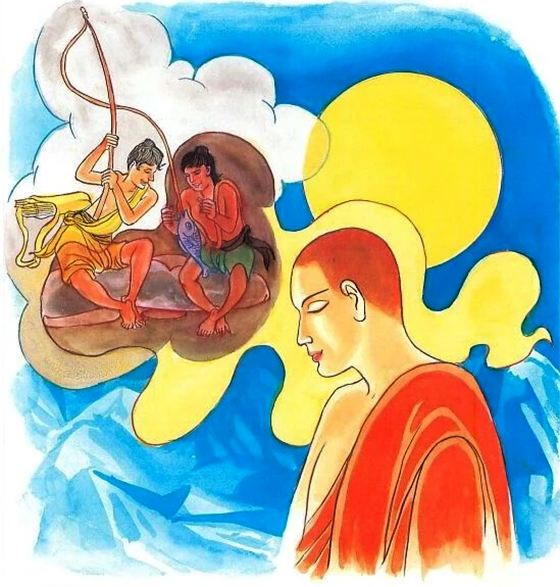The Story of Thera Angulimala
Verse 173: He who overwhelms with good the evil that he has done lights up this world (with the light of Magga Insight), as does the moon freed from clouds.
- kusalena: with good deed; the good in this context means Arahatta Magga, the fourth and final Path knowledge. (The Commentary)
The Story of Thera Angulimala
While residing at the Jetavana monastery, the Buddha uttered Verse (173) of this book, with reference to Thera Angulimala.
Angulimala was the son of the Head Priest in the court of King Pasenadi of Kosala. His original name was Ahimsaka. When he was of age, he was sent to Taxila, a renowned university town. Ahimsaka was intelligent and was also obedient to his teacher. So he was liked by the teacher and his wife; as a result, other pupils were jealous of him. So they went to the teacher and falsely reported that Ahimsaka was having an affair with the teacher’s wife. At first, the teacher did not believe them, but after being told a number of times he believed them; and so he vowed to have revenge on the boy. To kill the boy would reflect badly on him; so he thought of a plan which was worse than murder. He told Ahimsaka to kill one thousand men or women and in return he promised to give the boy priceless knowledge. The boy wanted to have this knowledge, but was very reluctant to take life. However, he agreed to do as he was told.
Thus, he kept on killing people, and not to lose count, he threaded a finger each of everyone he killed and wore them like a garland round his neck. In this way, he was known as Angulimala, and became the terror of the countryside. The king himself heard about the exploits of Angulimala, and he made preparations to capture him. When Mantani, the mother of Angulimala, heard about the king’s intention, out of love for her son, she went into the forest in a desperate bid to save her son. By this time, the chain round the neck of Angulimala had nine hundred and ninety-nine fingers in it, just one finger short of one thousand. Continue reading










